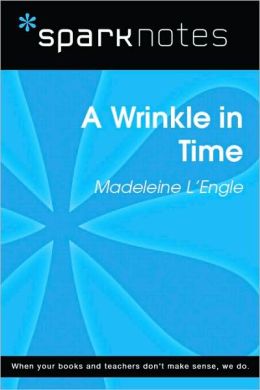I was reviewing a model ELA unit of study for a client that is aligned to the ELA CCSS. The unit was produced by a state Department of Education and is intended to be used with fifth grade students. I expected that a state DOE would produce apt models--given that the K-12 series is intended to (in)form teachers' work.
So, it was particularly shocking when I read these directions for students:
Students would repeat this process for chapters 2 and 3, beginning with the SparkNotes and then reading a only small portion of the actual literary text.
Yep, SparkNotes is the main text.
It seems incredible that SparkNotes are an equivalent to any literary text. I mean it's SparkNotes. Read all of the SparkNotes and just a small portion of Madeleine L'Engle's actual words? How can this make sense and why would a DOE put this out for educators to emulate?
In the SparkNotes version of A Wrinkle in Time, the 21-page first chapter is reduced to three paragraphs of information. Gone is the press of weather. Gone are the tensions among daughter, mother and brother. Nothing but the bare facts remain and it couldn't be sadder.
Surely this isn't a vision of literary learning we want to encourage.
So, it was particularly shocking when I read these directions for students:
Read the summary of A Wrinkle in Time, Chapter 1, from SparkNotes, then read the description of Mrs. Whatsit from the text.
Students would repeat this process for chapters 2 and 3, beginning with the SparkNotes and then reading a only small portion of the actual literary text.
Yep, SparkNotes is the main text.
It seems incredible that SparkNotes are an equivalent to any literary text. I mean it's SparkNotes. Read all of the SparkNotes and just a small portion of Madeleine L'Engle's actual words? How can this make sense and why would a DOE put this out for educators to emulate?
In the SparkNotes version of A Wrinkle in Time, the 21-page first chapter is reduced to three paragraphs of information. Gone is the press of weather. Gone are the tensions among daughter, mother and brother. Nothing but the bare facts remain and it couldn't be sadder.
Surely this isn't a vision of literary learning we want to encourage.



This is unbelievable. Maybe we should get rid of our books in the library and just by SparkNotes?
ReplyDeleteI loved the book too, so it made even more horrible. I assumed that all educators understood that not reading the literary work and reading the really bad summary was a bad thing to do. Who knew?
DeleteYou told me. I sort of believed you. You telling me sort of prepared me. Nonetheless, sickening.
ReplyDeletestill find it shocking too.
Delete